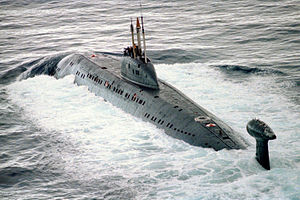Soviet submarine K-324
 A Victor III submarine similar to the K-324
| |
| History | |
|---|---|
| Builder | Komsomolsk Shipyard, Komsomolsk-on-Amur |
| Laid down | 1979 |
| Out of service | 1997 (in reserve) |
The K-324 was a Soviet Union Victor III Class submarine in reserve since 1997. It was assigned to the Northern Fleet.
Construction and launching
The K-324 was laid down on 29 February 1980 at Komsomolsk Shipyard in Komsomolsk-on-Amur in the Russian Far East. It was launched on 7 October 1980 and commissioned on 30 December 1980. It was the 7th ship of the class built at Komsomolsk.
Collision
In 1981, the K-324 collided with an unidentified American submarine of the Sturgeon class, purportedly USS Drum, in the Peter the Great Bay, not far from Vladivostok. The submarine was heavily damaged, to all reports. The United States government denied any of their submarines were in the area, and no US submarine reported any damage during that time period, but the Soviets reported none of their submarines were in the Bay aside from K-324.[citation needed]
Fleet transfer and operations
The K-324 transited across the Arctic in November and was officially transferred to the Northern Fleet on 3 December 1982.
Disabled

On October 31, 1983, the K-324 snagged the frigate USS McCloy's towed sonar array cable[1] 282 miles west of Bermuda, causing damage to the submarine's propeller. The submarine was towed to Cienfuegos, Cuba for repairs by a Soviet salvage ship beginning on November 5.[2] Soviet technicians recovered some parts of McCloy´s array.[3]
Later activities and decommissioning
The K-324 was again involved in operations around US waters in 1985. She was reported to have detected American SSBNs on three different times, tailing them for 28 hours. K-324 took advantage of temperature variations in the Gulf Stream.[4] K-324 was in reserve by 1997.[5] The K-324 was written off in 2000 for scrapping.
References
- ^ Norman Polmar, Kenneth J. Moore. Cold War Submarines: The Design and Construction of U.S. and Soviet. 2003. ISBN 1-57488-594-4.
- ^ Navysite.de - FF-1038.
- ^ Polmar, Norman and Moore, Kenneth (2004). Cold War Submarines: the design and construction of U.S. and Soviet submarines. Brassey's, p. 160. ISBN 1-57488-594-4
- ^ Thompson, Roger (2007). Lessons not learned: the U.S. Navy's status quo culture. Naval Institute Press, p. 91. ISBN 1-59114-865-0
- ^ Project 671 Victor class Federation of American Scientists
